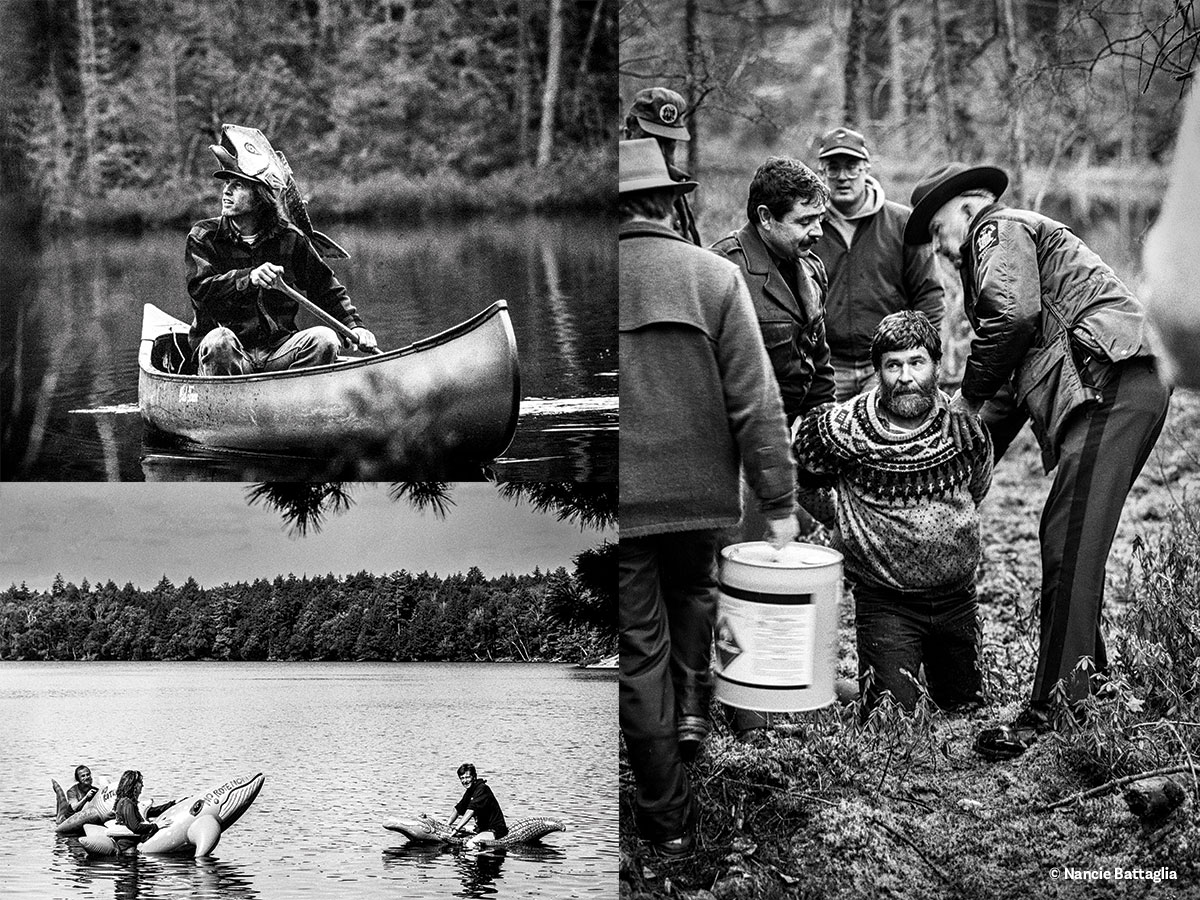A boater who had been partying all day collided with a family taking an evening cruise on Lake George. The family—and Lake George—will never be the same
Video footage from a boathouse security camera shows Lake George calm and quiet on the evening of July 25, 2016.
It’s after 9 p.m. and twilight has turned to darkness, making it hard to discern much other than the lights from homes on the far shore and the erratic, looping flight patterns of insects in the foreground.
Around 9:24, a boat—appearing only as a row of three lights—enters from the left, moving slowly. It is followed shortly after by a much faster boat with a single light, which soon catches up with the slow boat. The lights mingle briefly in a confusing jumble before the slower boat, now with two lights, drifts out of the frame. The other boat bobs in the water. The insects continue their oblivious aerobatics.
The eeriness of this silent footage, shown at the trial of Alexander West—the driver of the faster boat—is heightened by the knowledge of what it depicts: a horrific collision that took the life of an eight-year-old girl, seriously injured her mother, and upended the lives of everyone involved.
That morning, Eric McCue woke up around 10, disappointed to have slept in on his first day of vacation after being apart from his family for three weeks. McCue, the CEO of a skincare company, had stayed behind in California to work while his wife, Courtney, and their three kids—Madison, 10, Charlotte, eight, and Cooper, four—began their annual summer visit to the Lake George home of Courtney’s father and stepmother, Robert and Christine Knarr.
Eric and the kids spent most of the day by the water, fishing and swimming. The Knarrs’ 1920s Tudor home sits on a rise at the tip of Cramer Point, with paths leading down to the lake. The boathouse faces onto a small bay, affording a bit of quiet despite being in a busy section of the lake.
Bob Knarr had been coming to Lake George since the 1960s, when he and his high-school buddies hitchhiked from their Connecticut hometown. After he had a family and moved to Clifton Park, Bob and his first wife bought a boat to take their children, Keegan and Courtney, for rides on weekends. When they moved back to Connecticut they would rent a vacation home on the lake before eventually buying their own.
Through a second marriage, the kids growing up and moving away—Keegan to Florida and Courtney settling in Carlsbad, near San Diego—and the arrival of grandchildren, the lake remained a constant.
By the time Eric McCue woke up on July 25, 24-year-old Alex West was already out on the water in his family’s 21-foot Larson powerboat. He was on his way to Log Bay Day, an annual party held on the last Monday in July. West, a 2010 graduate of Lake George High School, grew up boating on the lake. After graduation he studied business at Castleton University, in Vermont, for a few semesters. A former ski racer, he moved to Colorado to work for the winter season, returning to his parents’ Lake George home in summers.
He picked up some friends—Morland Keyes, Matt Marry, Kristine Tiger and Cara Mia Canale, all in their 20s—at Marry and Tiger’s apartment in Kingsbury, southeast of Lake George, around 8:30 a.m., Canale testified at West’s trial. They stopped to buy beer before heading to Marine Village resort, where West worked and where his family’s boat was moored.
They got into the Larson and picked up three more passengers—Matt Peterson, Shelby Gordon and Montana Reilly—in Diamond Point. By 10:30 a.m., they were headed across the lake to Log Bay.
Log Bay Day began around 1997 as a way for Lake George locals to celebrate the season with a day of revelry on the water. In the early years, the band HalfStep would set up on a parasail raft and play to a flotilla of a few dozen boats, as well as others who drove by car to the Shelving Rock area and hiked down a short trail. As word of mouth spread and attendance grew, so did arrests for underage drinking, driving while intoxicated and other offenses. There were environmental concerns, too, over the effects of litter and the collective waste of hundreds of people wading in the water for hours. Law enforcement always maintained a heavy presence on and around the bay that day.
In 2016, despite a slightly lower turnout than usual, police made 26 arrests. One man broke his neck when he dove from a boat into shallow water.
The Knarrs moved to Lake George year-round in 2014. Bob, the CEO of a Connecticut-based medical-device company, works from his home office and travels frequently. He spent much of July 25th preparing for a meeting in Chicago the next day.
Sometime that afternoon he took a break to go food shopping at Jacobs & Toney, in Warrensburg, with Christine and their eight-year-old granddaughter, Charlotte. The McCues’ middle child—blonde, freckled, with a Pippi Longstocking fashion sense and a raspy voice her family jokingly attributed to a Pall Mall habit—was always game for an outing with Nana and Poppy. She adored her time at the lake. At school introductions in Carlsbad, the Knarrs recalled, she stood and said, “My name is Charlotte McCue and I’m from Lake George.”
Around 5 p.m., Courtney and the Knarrs prepared dinner. Bob had a glass of wine as they cooked, and another during the meal. He had been taking a beta-blocker since undergoing heart surgery in June, but his doctor had cleared him to drink in moderation. After dinner the family decided to take the Knarrs’ 28-foot antique GarWood for a “putt-putt” cruise to help the children wind down for bedtime. The 1928 boat has three cockpits, one in the rear and two in front of the engine. Eric sat in the back with Madison and Cooper; Courtney and Charlotte sat in the middle; and the Knarrs sat in front, with Bob as pilot.
They pulled out of their boathouse around 8:35 p.m., then took their usual route north through the no-wake zone by Speaker Heck Island, crossing the lake and then heading south along the Cleverdale shoreline. On the way back, Madison asked to move to the front with her grandparents. Charlotte fell asleep with her head on her mother’s lap.
Christine looked behind her and gave a sigh of gratitude over a wonderful family evening. They were almost home.
Though no one could say definitively how much alcohol Alex West consumed at Log Bay Day, several witnesses testified to seeing him drink beer at various times throughout the day. In one photograph time-stamped 2:27 p.m., West is holding what appears to be a beer bottle (he later told police he had stopped drinking by 1 p.m.). Multiple witnesses also saw him smoking “dabs,” or concentrated cannabis, and snorting cocaine.
Canale and Reilly testified that West and Matt Marry had prearranged for Marry to drive the Larson as they left Log Bay Day, because Marry wasn’t a drinker—dabs were his intoxicant of choice—and it was thought he would have a better chance of clearing the gauntlet of law enforcement surrounding the bay.
Around 6 p.m., Marry piloted the boat to Bolton Landing, where the group planned to go out for dinner. On the way there, Reilly testified, West was flirtier than usual (they had briefly dated, but West had broken it off), which she took to mean he was as drunk as she was. Canale, who said she had been up the night before tripping on LSD, fell asleep in the cuddy cabin, waking when they arrived at the Bolton public docks. They went to the Huddle, where Reilly sat next to West; they both ordered pot stickers and Moscow mules. West ordered a second cocktail, according to Reilly and Canale, though neither could say for sure whether he finished it.
Canale has struggled with heroin addiction and admitted to relapsing since the crash. She often appeared confused on the witness stand, though she insisted she recalled many details clearly. She and other witnesses (some of whom were in various states of intoxication themselves) said they saw no physical signs—stumbling, slurring words—that West was impaired.
After dinner, Reilly, Peterson and Gordon parted ways with the other five, who took the boat south toward Marine Village. West was at the wheel. At some point, Canale testified, Marry asked West’s speed, to which he replied 30 or 35 miles per hour.
The Garwood was near the shoreline just past Cooper Point when the Knarrs heard a series of booms, then a splash. Eric testified that he saw the bow of a white boat out of the corner of his eye. It crossed over the GarWood at an angle, exiting near Courtney and Charlotte. For a stunned moment, he was amazed no one was hurt. Then he heard his wife screaming. He went over the engine compartment to reach her and Charlotte.
The left side of Courtney’s torso was sliced open. Charlotte was limp, her damaged arm hanging off the seat. Eric told Courtney not to come near and covered his daughter with a blanket.
In the chaos and trauma, the Knarrs and McCues weren’t focused on what the Larson was doing. If anyone called out to ask if they were hurt, they didn’t hear it. The GarWood, still in gear, continued moving. Christine, initially too flustered to unlock her phone, managed to call 911 as Bob steered them to their boathouse. “We’ve been hit and there are two seriously injured,” she told the dispatcher. “They just tore apart our boat. Oh my gosh, please. Hurry, hurry.… Please hurry.”
When the Larson went airborne, Canale testified, she initially thought they had hit something sticking out of the water, not a boat. She and West, in his statement to police the next morning, say they never saw the GarWood until they hit it.
After she had collected herself and saw that everyone on the Larson was unhurt, though in shock, Canale said she noticed the taillights of the GarWood driving away and heard screaming. “There was no way any of us could have known there was a fatality,” she testified, “but I knew what had happened was not good.” She said she distinctly recalls West punching the steering wheel and saying, “But I had the right of way!”
The lights on the Larson were flickering, and the boat wasn’t running properly. West told police, “We were yelling, ‘Hey, are you all right? Do you need help?’ But they kept going so we thought maybe they were trying to avoid us.”
West said he was concerned about sinking, so he continued south to find a place he could safely dock. He settled on Tea Island Resort, a sister property of Marine Village.
Gregory Guerrieri, on vacation from Pennsylvania, was renting the house next door to the Knarrs’. On the evening of July 25, he and his mother were sitting on the porch facing the water when he heard what he judged to be a speeding boat and then a crash, followed by screaming. He ran inside to call 911, then hurried down to the water. He testified he saw two boats close together, and recognized one as the Knarrs’ boat, heading towards him. “I said to keep an eye on the other boat.… I remember saying to my mother, ‘That fucker’s leaving!’”
Just south of Cramer Point, several campers at Hearthstone Point also heard the crash and “blood-curdling” screams and called 911. Other vacationers to the north of Cramer Point jumped in a boat and went looking for the crash scene, but by the time they got there the boats were gone.
Ronald Miller, who lives on the east side of the lake, was driving his boat to pick up his daughter and son-in-law at the Inn at Erlowest, an upscale restaurant north of Lake George village, when he saw a slow-moving white powerboat with no lights on. He described the occupants as huddled in the boat and said they didn’t say anything or signal that they were in distress. “I was pissed off,” he testified. “I almost had an accident and I didn’t want anything to do with them.” When he arrived at the Inn at Erlowest he called 911 to report the boat as a hazard.
Around 9:30, a police detective from Cheektowaga, Timothy Turnbull, had just arrived at Tea Island Resort for a week-long vacation. He was on the sun deck with his fiancée when they heard emergency vehicles. “Honestly, I thought, I drove five hours to get away from this,” he testified.
He heard a slow-moving, gurgling boat approach and pull into an open slip. Turnbull looked through the railing and saw a boat with no lights, with a group of people in their 20s. He heard whispering and shushing, and heard a blonde female say, “Don’t you dare text or call anyone.” As they headed uphill toward Lake Shore Drive, the blonde said, “Everybody shut the fuck up.”
Turnbull called police and asked if they were looking for anyone, then relayed what he had witnessed.
Michael Kenny was at his apartment, a half-mile up a steep hill from Tea Island Resort, when his friends Alex West and Matt Marry knocked on his door, around 10 p.m. Kenny testified that West told him he had “messed up,” without specifying how, and asked for a ride. Kenny said he had to work early in the morning, so West and Marry went to ask Kenny’s roommate, Kyle Schoonover.
Schoonover testified that West told him he had run out of gas. Though he didn’t believe him, he said, “I assumed I was a designated driver and regardless of the reason I was doing the right thing.”
It wasn’t until they got outside that Schoonover realized there were three others who needed a ride. He described the mood of the group as strangely quiet as they drove to Glens Falls, where they dropped Keyes off, and then to Marry and Tiger’s apartment. “I had an uncomfortable feeling that something had gone on,” he said.
The next morning, when he learned about the crash, he and Kenny called police and gave statements.
Courtney McCue was taken to Glens Falls Hospital with serious injuries. As Bob Knarr waited in the hospital’s quiet room, Warren County Sheriff’s investigator John Maday came and asked him to take a Breathalyzer test. Upset and concerned about Courtney’s condition, he said he would do it in about an hour. When asked again later, he became angry. “They couldn’t find the people who had run over my boat and killed my granddaughter,” he testified. “I said I had called my lawyer and he said I didn’t have to.”
His refusal led Maday to request a warrant to administer a blood test. After a CT scan revealed Courtney had a fractured spine she was transferred to Albany Medical Center. Knarr told Maday he would take the Breathalyzer and admitted he hadn’t really called a lawyer, but once a warrant had been requested Maday had to follow through with the blood test. The test, taken at 1:30 a.m., showed a 0.0 alcohol level.
Martin and Cassie West were watching television around 10:30 p.m. when they saw the news about a boating accident on Lake George. They hadn’t spoken to their son, Alex, since noon or so, but were aware he had been out on the boat. “Whenever you hear about an accident, you worry” about your child, Cassie West said, in a joint phone interview with her husband.
Martin said that his son had standing permission to use the Larson and had never given them reason to fear he would act irresponsibly. “He took good care of it,” Martin said, and had never been in any kind of trouble—“Zero.”
They grew more worried when Warren County Sheriff’s Office Major James LaFarr came to their house in the middle of the night and began asking questions about the boat and Alex’s possible whereabouts, without confirming that he had been involved in an accident.
Cara Mia Canale, asleep on Matt Marry and Kristine Tiger’s couch, was awakened at 3:30 a.m. by Marry telling West his mother was calling. She testified that West was frantic, saying, “I have to leave, the cops are coming.”
By the time state police arrived at the apartment, at 4 a.m., West and Canale were gone. The investigator confiscated Marry and Tiger’s cell phones. Data extraction revealed Marry’s phone had been used to search for news about the crash with a browser that doesn’t track history; there were also text messages from and calls to Cassie West’s phone shortly after LaFarr’s visit.
The Wests said they didn’t tell Alex about Charlotte until morning because of an anxiety disorder that arose during college, after a close friend’s suicide. “That really changed him,” Martin said, but until the crash, “the old Alex seemed to be coming back.”
Alex went to the Warren County Sheriff’s Office around 7 a.m. on July 26. He told investigators he had stopped drinking early because he wasn’t feeling well. He claimed to have been going about 25 miles per hour and to have been paying close attention to his surroundings, but the other boat “came out of nowhere.” He said, “I have nothing to hide, it was a complete accident.”
Explaining why he hadn’t immediately called police, he said, “I did not make very good choices. I should have reached out to you right away, I was just so scared.”
When Maday asked him if he knew a child had died, he said, “It’s really sad,” and put his head down, apparently crying. “I just wish I would have saw them.”
He consented to take a blood test, which detected marijuana, cocaine and MDMA—Ecstasy—but his lawyers noticed a discrepancy in the dates on the warrant. Prosecutors decided not to use the test at trial, opting to establish drug use through other means.
West was charged with 12 counts, including second-degree manslaughter, criminally negligent homicide and leaving the scene of an accident. The passengers were charged with hindering a prosecution and giving false statements; Canale agreed to testify in a plea deal after another arrest, for driving while intoxicated, in September.
Public interest in the case was intense, with online commenters forming a virtual pitchfork mob and calling West spoiled and selfish. His parents said that characterization couldn’t be further from the truth. The Alex they described is “a good kid” who loves hiking with his dog and spending time with family; a hard worker who enjoyed sharing his knowledge of Lake George with tourists; a person of deep faith. “He’s not the monster he’s portrayed as,” said Martin West.
The Wests hired a prominent defense lawyer from Albany, Cheryl Coleman, who tried to have the case moved outside of Warren County, but Judge John Hall was unswayed. It took two days to impanel a jury.
There was standing-room only in the courtroom for opening statements in May. Warren County District Attorney Kate Hogan personally prosecuted the case, along with her lead assistant D.A., Jason Carusone. They called nearly 40 witnesses, including a boat accident reconstruction specialist who testified the damage to the two boats showed the Larson approached the GarWood at an angle that would mean West was in an overtaking position and did not have the right of way. Even if he had, marine law experts said, he was still responsible for avoiding a collision. The coroner who handled Charlotte McCue’s autopsy testified that she died instantly from head injuries sustained from the Larson’s propeller.
Charlotte’s family gave emotional testimony. At one point the jury was shown a photograph of a bruise on Courtney McCue’s left thigh, which she explained was where her daughter’s head had been at the time of the impact. “I still have a bruise,” she said, “a nine-month-old bruise.”
The defense tried to poke holes in Hogan’s case by calling into question witnesses’ recollections, pointing out clerical mistakes in law enforcement reports and questioning why Robert Knarr was treated differently from West by investigators.
The defense hired its own expert to rebut the prosecution’s theory of the angle of impact—a retired FBI agent and boater who wasn’t trained in accident reconstruction and who didn’t personally inspect the boats until the day before testifying. He contended that the Larson hit the GarWood at closer to a 90-degree angle, which would mean West had the right of way.
West did not testify. In closing statements, Coleman conceded her client had erred in not immediately reporting the accident. “Who remembers what it’s like to be 24?” she said. “Who remembers what it’s like to be dumb?”
After two days of deliberation, the jury found West guilty on all but four counts, the ones related to drug impairment. At the sentencing hearing, on June 5, Judge Hall allowed three family members to read impact statements: Courtney McCue, Christine Knarr and Bob Knarr, who read Eric McCue’s statement because he couldn’t “bear to be in the same room as” West.
Courtney described the physical and emotional pain she has endured since the crash, saying she feels like an empty shell of a human, a zombie. “We will always look to the lake with sadness and grief,” she said. “How do we get our kids to feel safe again?”
Christine Knarr noted that four-year-old Cooper had originally thought that pirates had taken his sister. She said Charlotte had shown more integrity in her eight years than Alex West had in his 24, calling his boat “a loaded gun” after he had partied all day.
West gave a brief statement, saying that he is haunted every day by having had a part in Charlotte’s death.
Judge Hall sentenced West to five to 15 years in state prison. His lawyer said they will appeal the verdict.
A few days later, Charlotte’s family filed a lawsuit against West, his parents, and the passengers on the Larson, except Canale. They are asking for three-million dollars in damages for the survivors; a wrongful-death suit will follow once Charlotte’s estate is settled. It’s not about the money, the Knarrs said, it’s the principle. People who drink or do drugs and get behind the wheel of any vehicle “need to know that they’re going to be held accountable,” Bob said.
If authorities have their way, Log Bay Day 2016 was the last. Law enforcement agencies have a plan to keep partiers out of the bay that day. Boat patrols have increased throughout the summer, and Lake George marinas will be required to show renters a safety video before letting them on the water. Marinas and restaurants are being offered training to spot people who have had too much to drink. The Knarrs recently donated a drug-detection device—akin to a Breathalyzer—to the Warren County Sheriff’s Office.
In mid-June, Bob and Christine Knarr sat in their kitchen facing the lake that had once been their sanctuary. They paged through photo albums representing years of memories—Charlotte making silly faces, posing with her siblings, jumping off the boathouse, fearless at age four.
They described the flashbacks that descend like a movie screen in front of them. Therapy has helped, they said, but the trial forced them to relive the horror. In some ways it was even worse than the actual crash, because now they know what each of the others on their boat experienced.
They’ve put the house on the market, unsure if they want to stay. Forming her hands into a ball, Christine said the lake has been the nucleus of the family, “so the fact that Charlotte was killed here hurts to the depths of our souls.”
Asked where else they might go, they exchanged a look. “We never thought at this time in our life we would have to start over,” Bob said.
Christine said they have days when they are ready to fight to salvage their love for this place, and others when they wonder if they can ever recapture some of their former happiness. What it may come down to, she said, is a question: “Are we going to let Alex West take Lake George from us?”























